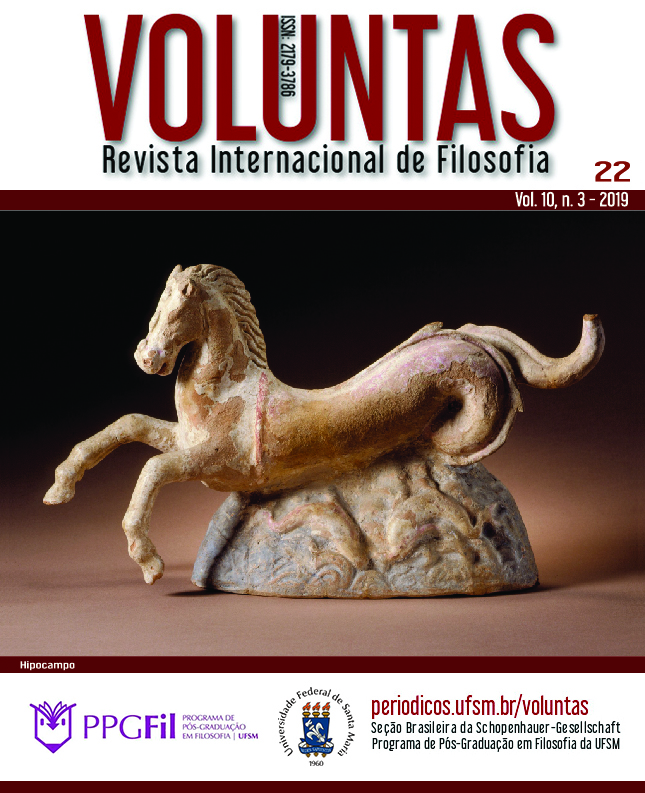Animalidade e apostasia da vontade: Nietzsche vê Schopenhauer
DOI:
https://doi.org/10.5902/2179378640128Palavras-chave:
Metafísica, Inconsciente, Vivência, TrágicoResumo
O objetivo deste artigo é fazer ver de que modo o caráter de Janus – do mito de Janus – da filosofia de Schopenhauer pautou a relação que com ela entabulou a filosofia de Nietzsche –, aspecto este um tanto relegado pela pesquisa Nietzsche, talvez justamente por se tomar a relação entre ambos como exaurida em binômios do tipo “adesão e ruptura”, “encantamento e distanciamento crítico", “pessimismo e afirmação da vida”. Assim sendo, num primeiro momento preliminar procederemos a analisar a face dual da filosofia de Schopenhauer, cujo olhar se volta simultaneamente ao passado e ao futuro. Num segundo momento preliminar visitaremos a ousadia de Schopenhauer ao converter as ambições malogradas da filosofia (na figura da “coisa em si”) no princípio inconsciente da vontade. A partir daí passaremos à compreensão de Schopenhauer por Nietzsche ao modo de um filósofo que, vitimado por sua segunda natureza, alemã, esquiva-se de protagonizar a filosofia trágica, que chegou a tangenciar, em função do esquadrinhamento metafísico de sua arrojada descoberta – o inconsciente na espécie humana.
Downloads
Referências
ASSOUN, P.-L. Freud et Nietzsche. Paris: Presses Universitaires de France, 1998.
ASSOUN, P.-L. Freud - La philosophie et les philosophes. Paris: Presses Universitaires de France, 1976.
BOZICKOVIC, V. Schopenhauer on Scientific Knowledge. In: VANDENABEELE, B. A Companion to Schopenhauer. Malden, MA: Wiley-Blackwell, 2012, p. 11-24.
GARDNER, S. Schopenhauer Will and the Unconscious. In: JANAWAY, C. The Cambridge Companion do Schopenhauer. Cambridge: Cambridge, University Press, 1999, p. 375-421.
GÖDDE, G. Traditionslinien des “Unbewußten”. Schopenhauer – Nietzsche – Freud. Gießen: Psychosocial-Verlag, 2009.
KRIEGER, S. O cerne oculto do projeto nietzschiano: logos versus pathos no ato de filosofar. Tese apresentada ao Programa de Pós-Graduação em Filosofia da Escola de Filosofia, Ciências Humanas e Letras da Universidade Federal de São Paulo (Unifesp) em abril de 2019.
JACQUETTE, D. Schopenhauer’s Proof that Thing-in-Self is Will. Kantian Review, 12, 2006, p. 65-108.
JANAWAY, C. Introduction. In: JANAWAY, C. The Cambridge Companion to Schopenhauer. Cambridge: Cambridge University Press, 1999, p. 1-17.
MARQUES, U. R. A. (org.) Kant e a biologia. São Paulo: Barcarolla, 2012.
NIETZSCHE. F. Werke. Kritische Gesamtausgabe (KGW). Berlin/New York: Walter de Gruyter, 1967-1978.
NIETZSCHE. F. Werke. Kritische Studienausgabe (KSA). Berlin/New York: Walter de Gruyter, 1999.
NIETZSCHE. F. A gaia ciência. Trad. Paulo César de Souza. São Paulo: Companhia das Letras, 2011.
NIETZSCHE. F. Além do bem e do mal. Trad. Paulo César de Souza. São Paulo: Companhia das Letras, 1999.
NIETZSCHE. F. Além do bem e do mal. Trad. Saulo Kriger. São Paulo: Edipro, 2019
NIETZSCHE. F. Aurora. Trad. Paulo César de Souza. São Paulo: Companhia das Letras, 2008.
NIETZSCHE. F. Ecce homo. Trad. Paulo César de Souza. São Paulo: Companhia das Letras, 2011.
NIETZSCHE. F. Humano, demasiado humano I. Trad. Paulo César de Souza. São Paulo: Companhia das Letras, 2012.
NIETZSCHE. F. Humano, demasiado humano II. Trad. Paulo César de Souza. São Paulo: Companhia das Letras, 2008.
NIETZSCHE. F. O nascimento da tragédia. Trad. Jacob Guinsburg. São Paulo: Companhia das Letras, 2012.
SCHENZ, A. Erlebnis und Bildung. Die Bedeutung des Erlebens und des Erlebnisses in Unterrichts- und Erziehungsprozessen.
Karlsruhe: Universitätsverlag Karlsruhe, 2007.
SCHOPENHAUER, A. Die Welt als Wille und Vorstellung. Zweiter Band. München: Georg Müller, 1913 (W II).
SCHOPENHAUER, A. O mundo como vontade e como representação. Trad. Jair Barboza. São Paulo: Editora Unesp, 2005 (W I).
SEGALA, M. Philosophie de la Nature et science chez Schopenhauer. In: Schopenhauer – Nouvelles Lectures. Les Études
Philosophiques, 2012/3, no 102, p. 389-408.
SOLL, I. Schopenhauer as Nietzsche´s ‘Great Teacher’ and ‘Antipode’. In: GEMES K. & RICHARDSON, J. The Oxford Handbook of Nietzsche. Oxford: Oxford University Press, 2013.
SOMMER, A. U. O que Nietzsche leu e o que não leu. Trad. Saulo Krieger. Cadernos Nietzsche, São Paulo, v. 40 n. 1, janeiro/abril 2019, p. 9-43.
VIESENTEINER, J. L. O conceito de vivência (Erlebnis) em Nietzsche. Gênese, significado e recepção. Kriterion, Belo Horizonte, n. 127, junho 2013, p. 141-155.
ZAMBONINI, F. Schopenhauer e la scienza moderna: discorso per la solene inaugurazione dell’anno accademico della Reale Università di Sassari. Sassari: Tip. Dita G. Dess, 1911.
Publicado
Como Citar
Edição
Seção
Licença
A submissão de originais para este periódico implica na transferência, pelos autores, dos direitos de publicação impressa e digital. Os direitos autorais para os artigos publicados são do autor, com direitos do periódico sobre a primeira publicação. Os autores somente poderão utilizar os mesmos resultados em outras publicações indicando claramente este periódico como o meio da publicação original.
A Voluntas é um periódico de acesso aberto sob a licença Creative Commons Atribuição-NãoComercial-CompartilhaIgual 4.0 Internacional (CC BY-NC-SA 4.0).






